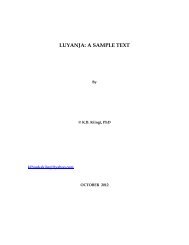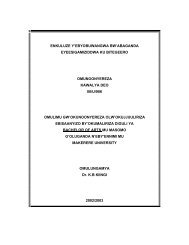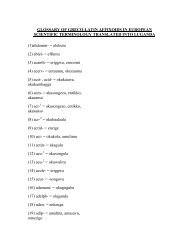Part 2 - Luganda Scientific Terminologies Research
Part 2 - Luganda Scientific Terminologies Research
Part 2 - Luganda Scientific Terminologies Research
You also want an ePaper? Increase the reach of your titles
YUMPU automatically turns print PDFs into web optimized ePapers that Google loves.
XVI. MODULARITY OF LANGUAGE<br />
Besides lexicographical anisomorphism (cf. Sec VII) the lexicographer is obliged to<br />
always think in terms of the modules of language. Nine modules may be identified as:<br />
• morphological<br />
• lexicological<br />
• syntactic<br />
• semantic<br />
• pragmatical<br />
• textological<br />
• phonetic<br />
• phonological<br />
• graphological<br />
If the lexicographer can utilise intralinguistic interfaces like morphophonology,<br />
morphosyntax, morphosemantics, phonographonology, semanticopragmatics, and<br />
syntacticosemantics on the one hand, and extralinguistic interfaces such as<br />
sociolinguistics, gender linguistics, and psycholinguistics on the other hand, then his/her<br />
mindset is said to be finetuned to undertake lexicographical work.<br />
XVII. MORPHEMES AND ENGLISH MORPHS<br />
1. PROCESS, ACTION<br />
-ation, -ion; -ing; -ment; -al; -ance, -ence; -ure<br />
enkwajja y’okuTa, ekikolwa ky’okuTa<br />
2. RESULT or INSTANCE OF PROCESS/ACTION<br />
-ation; -ion; -ing; -ment; -al; -age; -ance; -hood; -ure<br />
ekiva mu kuTa, ekyeyoleko ky’okuTa<br />
3. MUTATION, CAUSATION<br />
-en; -ent; -ize; -(i)fy; -ate; be-; en-<br />
okuDwala, okuDwaza<br />
4. CAUSER/AGENT<br />
52





